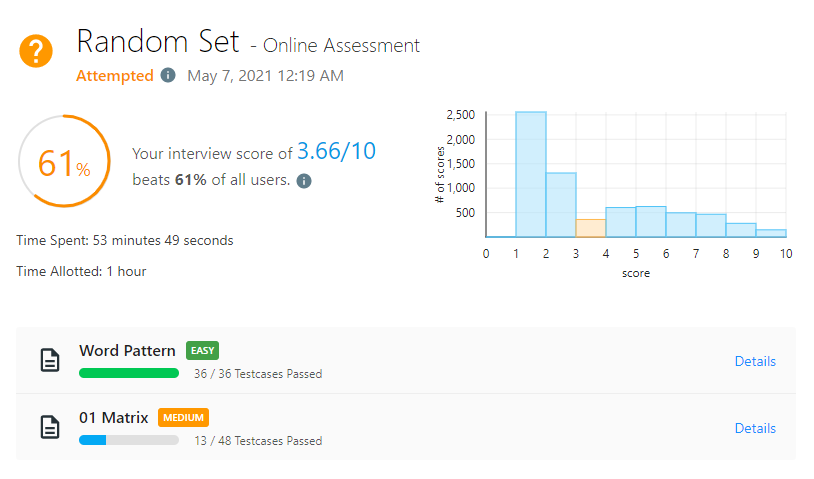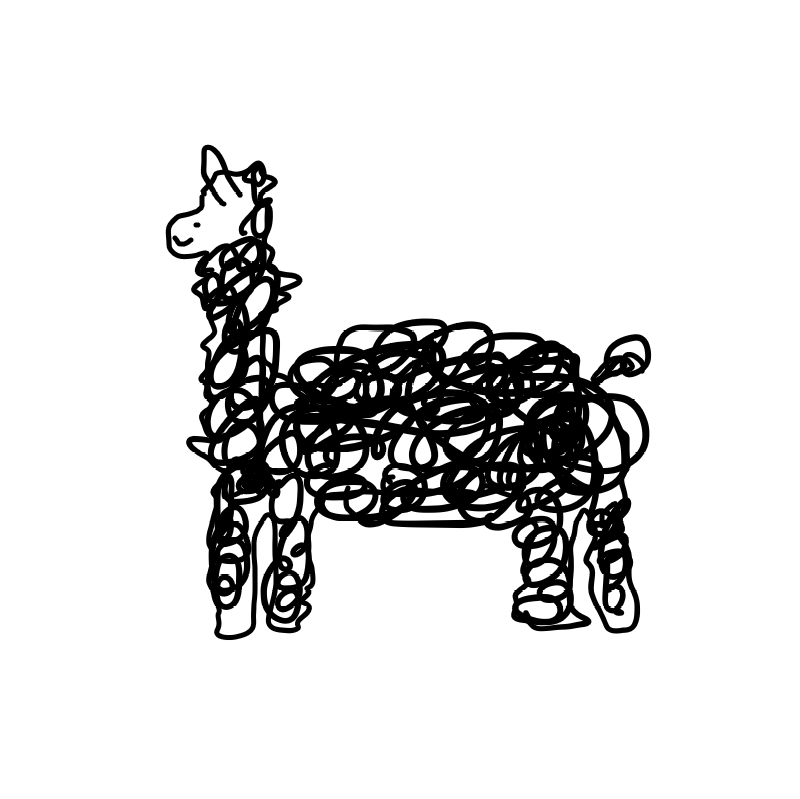
290. Word Pattern
Given a pattern and a string s, find if s follows the same pattern.
Here follow means a full match, such that there is a bijection between a letter in pattern and a non-empty word in s.
My Answer 1: Accepted (Runtime: 32 ms - 48.26% / Memory Usage: 14.3 MB - 54.71%)
class Solution:
def wordPattern(self, pattern: str, s: str) -> bool:
string = s.split()
dic = {}
if len(pattern) != len(string):
return False
for i in range(len(pattern)):
if pattern[i] in dic:
if dic[pattern[i]] != string[i]:
return False
else:
if string[i] in dic.values():
return False
dic[pattern[i]] = string[i]
return Trues 는 split 으로 나눠서 string 에 저장하고
pattern 대로 dic 에 저장 => a: dog 이런 식
이미 패턴이 정해진 문자는 기존의 값과 비교해서 다르면 False
패턴이 없는 문자는 새로 넣어주는데 이때, string[i] 가 이미 사용되었는지 확인해주기
map(s.find, s) == map(t.index, t)요런거도 가능
542. 01 Matrix
Given an m x n binary matrix mat, return the distance of the nearest 0 for each cell.
The distance between two adjacent cells is 1.
My Answer 1: Wrong Answer (13 / 48 test cases passed.)
class Solution:
def updateMatrix(self, mat: List[List[int]]) -> List[List[int]]:
def zero(mat, i, j, n):
if i < 0 or i >= len(mat) or j < 0 or j >= len(mat):
return float('inf')
if i - 1 >= 0 and mat[i-1][j] == 0:
return n+1
elif i + 1 < len(mat) and mat[i+1][j] == 0:
return n+1
elif j - 1 >= 0 and mat[i][j-1] == 0:
return n+1
elif j + 1 < len(mat[0]) and mat[i][j+1] == 0:
return n+1
else:
m = float('inf')
if i - 1 >= 0 and result[i-1][j] != 0:
m = min(result[i-1][j] + 1, m)
elif i + 1 < len(mat) and result[i+1][j] != 0:
m = min(result[i+1][j] + 1, m)
elif j - 1 >= 0 and result[i][j-1] != 0:
m = min(result[i][j-1] + 1, m)
elif j + 1 < len(mat[0]) and result[i][j+1] != 0:
m = min(result[i][j+1] + 1, m)
return m
result = []
for i in range(len(mat)):
result.append([0]*len(mat[i]))
for i in range(len(mat)):
for j in range(len(mat[i])):
if mat[i][j] == 0:
result[i][j] = 0
else:
result[i][j] = zero(mat, i, j, 0)
return resultdp 처럼 누적 distance 를 가져와서 더해가는 걸로 하려고 했는데...
i+1, j+1 의 경우는 미리 확인한 값이 아니라서 안된다는 것을... 뒤늦게 깨달았다...
재귀 써야할 듯
Solution 1: Accepted (Runtime: 524 ms - 96.71% / Memory Usage: 16.2 MB - 98.15%)
class Solution:
def updateMatrix(self, mat: List[List[int]]) -> List[List[int]]:
m, n = len(mat), len(mat and mat[0])
for i in range(m):
for j in range(n):
if mat[i][j] != 0:
mat[i][j] = float("inf")
if i > 0 and mat[i - 1][j] + 1 < mat[i][j]:
mat[i][j] = mat[i - 1][j] + 1
if j > 0 and mat[i][j - 1] + 1 < mat[i][j]:
mat[i][j] = mat[i][j - 1] + 1
for i in range(m - 1, -1, -1):
for j in range(n - 1, -1, -1):
if mat[i][j] != 0:
if i + 1 < m and mat[i + 1][j] + 1 < mat[i][j]:
mat[i][j] = mat[i + 1][j] + 1
if j + 1 < n and mat[i][j + 1] + 1 < mat[i][j]:
mat[i][j] = mat[i][j + 1] + 1
return mat가장 이해하기 쉬웠던 루션이.. BFS
따로 변수 선언 없이 그냥 mat 로 끝냄
우선 값이 1 이면 i-1, j-1 값들에 1 을 더해줌
그러고 아까 만났던 문제 해결을 위해서..
뒤에서부터 쭉 보면서 i+1, j+1 을 기반으로 다시 업데이트 => 최솟값일 때만
재귀가 더 복잡한가보다... 잘 안보임
큐나 덱 쓰는 게 많은데 뭔소린지 하나도 모르겠음
그냥 이걸로 외우는 걸로^^
